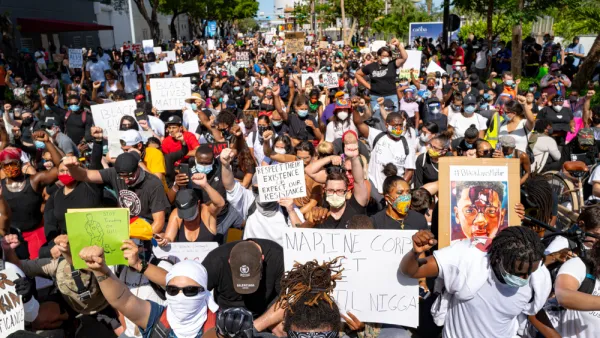The mass protests that have swept through Brazilian cities over the past week where sparked by planned bus fare increases, but quickly expanded to encompass a variety of complaints. Will the protests end now that fares have been lowered?
Late yesterday, the leaders of Sao Paolo, Rio de Janeiro, and other cities that have been roiled by mass demonstrations agreed to cut bus fares in response to the demands of protestors, reports Gisele Regatao. However, since the start of the demonstrations, the protests have grown to encompass a variety of complaints.
At Next City, Sam Seifman points to displeasure with the largess invested in two upcoming sporting events: the 2014 World Cup and the 2016 Summer Olympics in Rio. "Writers for Next City have previously pointed out why large-scale sporting events, and the huge stadium projects that accompany them, rarely benefit the neighborhoods and populations in the areas where they pop up," he says. And in Brazil, "[s]uch outsized spending is taking place at time when basic infrastructure needs remain unmet and the nation’s higher education system remains a mess."
Writing for The Smoke Filled Room blog, Raphael Neves, PhD candidate at the Politics department at the New School for Social Research, and assistant professor of politics at the University of São Paulo, blames the growing pains that have accompanied the country's astounding economic rise.
"On the one hand, a large part of the population has been integrated into the economic market and consumption levels have never been so high," says Neves. "On the other hand, this possibly made people more aware of other problems way beyond material needs. A minimum wage worker may now choose which cell phone or TV she or he is going to buy, but one is unable to have dominion over basic aspects of everyday life. In São Paulo, where rent is as expensive as in New York, someone who lives in a poorer area will spend at least two hours in an extremely crowded bus or train to get to work. To lose control over one’s own time and space is enough reason to revolt, isn’t it?"
With so many sources fueling the protests, It's unclear if the fare rollbacks will help to tamp them down. In fact, according to Simon Romero, protest leaders are calling for the largest action yet today.
FULL STORY: Mass Protests in Brazil Win Bus Fare Reductions

National Parks Layoffs Will Cause Communities to Lose Billions
Thousands of essential park workers were laid off this week, just before the busy spring break season.

Retro-silient?: America’s First “Eco-burb,” The Woodlands Turns 50
A master-planned community north of Houston offers lessons on green infrastructure and resilient design, but falls short of its founder’s lofty affordability and walkability goals.

Delivering for America Plan Will Downgrade Mail Service in at Least 49.5 Percent of Zip Codes
Republican and Democrat lawmakers criticize the plan for its disproportionate negative impact on rural communities.

Test News Post 1
This is a summary

Test News Headline 46
Test for the image on the front page.

Balancing Bombs and Butterflies: How the National Guard Protects a Rare Species
The National Guard at Fort Indiantown Gap uses GIS technology and land management strategies to balance military training with conservation efforts, ensuring the survival of the rare eastern regal fritillary butterfly.
Urban Design for Planners 1: Software Tools
This six-course series explores essential urban design concepts using open source software and equips planners with the tools they need to participate fully in the urban design process.
Planning for Universal Design
Learn the tools for implementing Universal Design in planning regulations.
EMC Planning Group, Inc.
Planetizen
Planetizen
Mpact (formerly Rail~Volution)
Great Falls Development Authority, Inc.
HUDs Office of Policy Development and Research
NYU Wagner Graduate School of Public Service



























